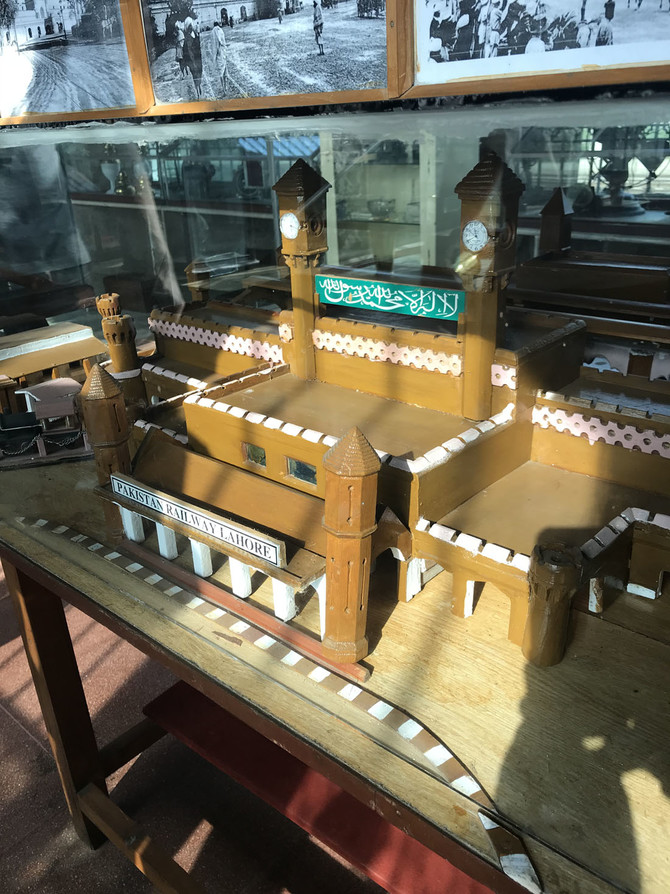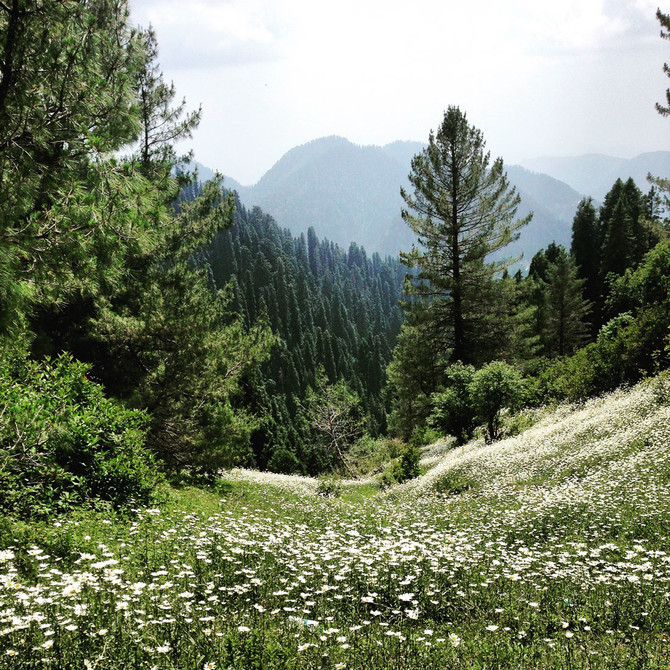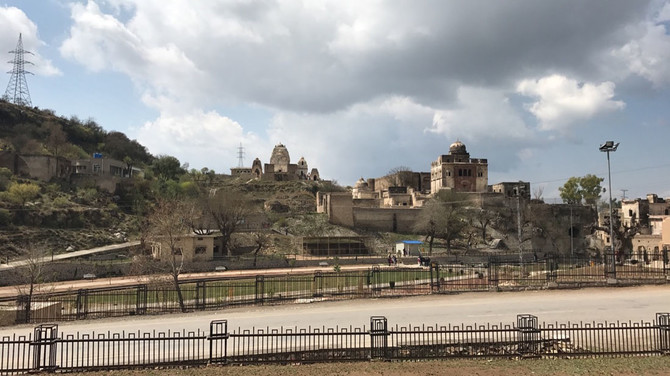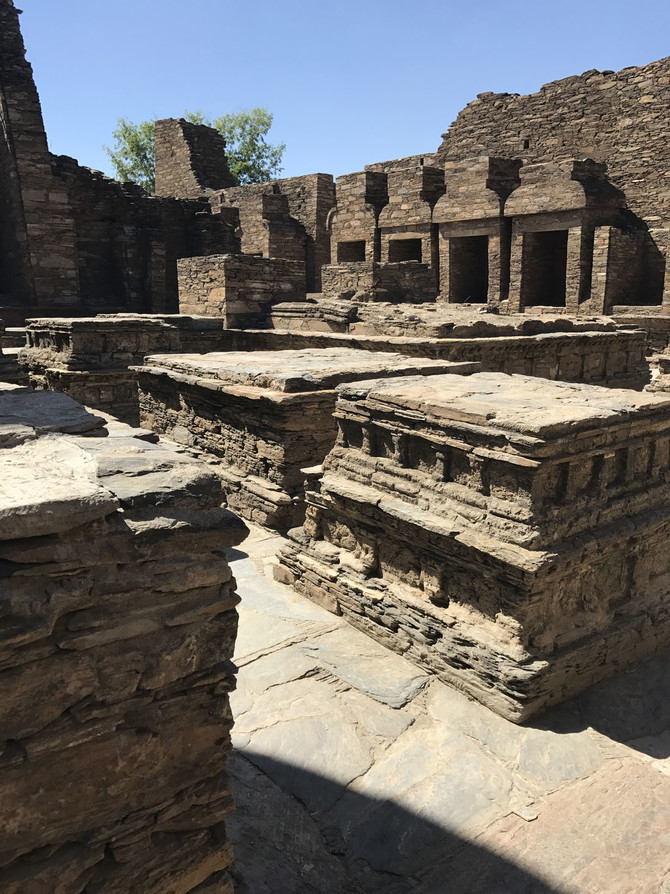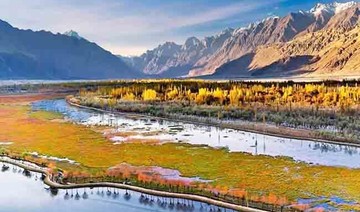ISLAMABAD: Whether we call ourselves Islamabadians, Isloo-ites or (for the young crowd) Islamabaddies, we can give non-capital-dwelling Pakistanis plenty of reasons why we love our city so much. We have the Margalla Hills, for example, with greenery that is overwhelming in the best possible way, and also a front-row seat to the shenanigans of those who run our country.
However, as much as we love the urban life, everyone needs to get away from the hustle and bustle once in a while, and another major benefit of living in Islamabad if the number of great places within easy reach for a quick escape.
When the city goes to sleep, which is relatively early, or the social scene grows tired, which is relatively often, residents are spoiled for choice if they want to head off for a while, whether for a day trip, a long weekend, or even just a few hours of respite.
The easiest escape to make, which you can do on foot, is to head to the Margalla Hills, which give Islamabad’s skyline a substantial scenic boost over other major cities, such as Lahore and Karachi. The Margallas are filled with lush greenery and well-maintained hiking trails that guide you from stony paths to creek beds and forested areas to wide-open ridge walks, all while giving you unparalleled views of the city.
If you really want to hit the hills, drive up to the hill station, or mountain resort town, of Nathia Gali. You will pass through a number of other hill-top towns along the way, including Murree and Bhurban, along with and smaller settlements, such as Charra Pani, offering rest stops and restaurants. It all makes for a wonderful and relaxing few hours away from the city.
For a slightly longer break, Nathia Gali in particular is a great choice for a weekend getaway, with views that will take your breath away (literally, given the altitude) and fantastic hiking trails that allow you to leave the concrete jungle far behind and immerse yourself in nature.
Hills and hiking are not for everyone, and for the nature adverse there are other options for day trips.
In about an hour or less you can drive from the city to Golra Sharif Railway Station. A beautifully preserved, and still-operating, piece of history, the station is impeccably managed, with an on-site museum documenting the history of the station and the country’s relationship with railways, complete with a number of interactive displays. A particular highlight is the chance to tour the railway carriage that Pakistan’s founder, Muhammad Ali Jinnah, traveled in.
About an hour and half from Golra Sharif, there is the chance to take a dip (monsoon permitting) in the cooling waters of the Khanpur Dam. If messing about in the water is not your idea of fun, it is still worth heading there right before spring slips into summer to pick blood oranges straight from the trees.
A mere two hours from there you can find Pakistan’s last active Hindu worship site, the Katas Raj Temples. Located near Kallar Kahar, the group of temples, connected by walkways, are a popular tourist site. Their architectural beauty is set off by the sacred pond they surround which, legend has it, was formed from the teardrops of the Hindu god Shiva after the loss of his wife, Sati.
On the drive back to Islamabad, make a stop at the famed Khewra Salt Mine, outside of Jhelum, which is another popular tourist attraction. After exploring the brightly lit caves — and, if you dare, taking a taste of the salt direct from the walls — you can buy a souvenir of your visit, including pink salt from the mine and gifts crafted from salt, such as lamps and paperweights.
Another great escape within a two-hour drive of the city is Rohtas Fort. A UNESCO-protected World Heritage Site, the massive 16th-century fortress in Jhelum has survived the centuries relatively intact.
Those prepared to venture slightly further afield should head for Mardan to see Takht-i-Bahi, an incredible ancient relic of Buddhism dating back as far as the 1st century. The former monastery, the remains of which have been remarkably well preserved, is also on the UNESCO list and a protected site in Pakistan, and the government has made efforts to restore it where needed.
Whatever your recreational preferences, and whether you have a couple of hours to kill or a few days, a cultural, historical or nature retreat is waiting for you within easy reach of Islamabad.
Culture, history and nature: Islamabad’s best and easiest getaways
Culture, history and nature: Islamabad’s best and easiest getaways

- A drive of less than three hours will take you far from the hustle and bustle of the city and bring you face to face with some of Pakistan’s hidden heritage and historical sites
- Great getaways within easy driving distance of the capital include protected historical sites in Jhelum, Khewar and in Mardan
Pakistan forms special task force to curb human smuggling after Morocco boat capsize

- A migrant boat capsized near Morocco’s coast on Jan. 15 while carrying 86 migrants, including 66 Pakistani nationals
- The tragedy once again underscored the perilous journeys many migrants embark on due to conflict, instability at home
ISLAMABAD: Prime Minister Shehbaz Sharif has formed a special task force to curb human smuggling in Pakistan, Sharif said on Friday, days after a migrant boat carrying over 60 Pakistanis capsized near Morocco.
The boat capsized near Morocco’s coast on Jan. 15 while carrying 86 migrants, including 66 Pakistanis, according to migrant rights group Walking Borders.
Moroccan authorities said a day later 36 people were rescued from the vessel which left Mauritania on Jan. 2, while the Pakistani Foreign Office has said the survivors include 22 Pakistanis.
Sharif announced the launch of the task force at a meeting to review action against human traffickers, his office said, adding that the prime minister will himself head the task force.
“The arrests of members of groups involved in human trafficking should be expedited,” Sharif told officials at the meeting. “All institutions, including the Ministry of Foreign Affairs, should play their full role in identifying human traffickers.”
The Morocco tragedy has once again underscored the perilous journeys many migrants, including Pakistanis, embark on due to conflict and economic instability in their home countries.
In 2023, hundreds of migrants, including 262 Pakistanis, drowned when an overcrowded vessel sank in international waters off the southwestern Greek town of Pylos, marking one of the deadliest boat disasters ever recorded in the Mediterranean Sea. More recently, five Pakistani nationals died in a shipwreck off the southern Greek island of Gavdos on Dec. 14.
The Pakistani government has ramped up efforts in recent months to combat human smugglers facilitating dangerous journeys for illegal immigrants to Europe, resulting in several arrests. PM Sharif has also urged increased collaboration with international agencies like Interpol to ensure swift action against human trafficking networks.
Officials informed participants of Friday’s meeting that so far, six organized human trafficking gangs have been identified, 12 cases have been registered, three key traffickers have been arrested, and 16 names have been placed on the passport control list. They were also apprised of the details of seizure of vehicles, bank accounts and assets.
“The murderers of humanity involved in human trafficking will be brought to justice,” Sharif said.
Parliament elects ex-PM Khan aide as head of accountability body amid Pakistan political tensions

- Pakistan parliament elects ex-PM Khan aide as head of accountability body amid political tensions
- Member of the government’s team criticizes Khan’s party for calling off the parleys, says differences can only be resolved through talks
ISLAMABAD: Pakistan’s National Assembly, the lower house of parliament, on Friday elected a member of former prime minister Imran Khan’s Pakistan Tehreek-e-Insaf (PTI) opposition party as the head of its accountability committee, amid prevailing political tensions in the South Asian country.
The Public Accounts Committee is among the most powerful parliamentary bodies in Pakistan and holds the authority to summon virtually any individual or record from government departments. Its main objective is to uphold transparency and accountability across all public and constitutional institutions, promoting financial integrity and good governance.
The development came a day after ex-PM Khan called off negotiations with the government over its failure to establish judicial commissions to investigate violence at anti-government protests organized by his party. The talks, which began last month after Khan threatened a civil-disobedience movement, aimed to ease political tensions, but have not yielded desired results after three rounds.
Khan’s ouster in a parliamentary no-trust vote in 2022 has plunged Pakistan into a political crisis, particularly since he was jailed in August 2023 on corruption and other charges. His PTI party has regularly held protests to demand his release, with many of the demonstrations turning violent. At the last meeting on Jan. 16, the PTI had given the government seven days to announce the truth commissions, a deadline that expired on Thursday.
But despite the government-opposition stalemate, Junaid Akbar Khan, a lawmaker from Khan’s PTI party, was elected on Friday unopposed as the head of the National Assembly’s Public Accounts Committee (PAC), according to a statement issued by the National Assembly Secretariat. The post of the PAC chairman had been vacant since the general election in Feb. last year.
“I will move forward taking all the [committee] members with me,” Junaid was quoted as saying by the National Assembly Secretariat, as committee members assured him of their support.
The announcement of Junaid’s election as PAC chairman came hours after the PTI refused to attend the next round of talks with the government on Jan. 28
The PTI’s demands to the government revolve around the release of all political prisoners including Khan, and the formation of two judicial commissions to probe into violent protest rallies, including one on May 9, 2023, when PTI supporters rampaged through military offices and installations, and a second one on Nov. 26, 2024 to demand Khan’s release, in which the government says four troops were killed.
Speaking to reporters in Islamabad, Senator Irfan Siddiqui, a member of the government’s negotiations team, criticized the PTI for calling off the parleys.
“Come out of this confusion, and come sit with us on the 28th,” he said in televised comments, referring to Khan’s party. “Whether the commission will be formed or not, it will be decided there.”
Pakistan stick with spin as they chase West Indies series sweep

- Pakistan completed a 127-run win inside three days in the opening Test, with spinners Sajid Khan taking nine wickets
- West Indies spinner Jomel Warrican also grabbed a career-best 7-32 as 34 of the 40 wickets in the match went to spinners
MULTAN: Head coach Aaqib Javed brushed aside criticism of Pakistan’s reliance on spin bowling as they seek a clean sweep against the West Indies in the second Test starting on Saturday.
Pakistan completed a 127-run win inside three days in the opening Test, with spinners Sajid Khan taking nine wickets, Noman Ali six and Abrar Ahmed five for their third straight win at home.
West Indies left-arm spinner Jomel Warrican also grabbed a career-best 7-32 as 34 of the 40 wickets in the match went to spinners.
The second Test will also be played on a dry and grassless pitch in the central city of Multan.
Former Pakistan players and analysts hit out at the spin-heavy strategy, saying the team would struggle on away tours where pitches may not be as conducive to spin.
Aaqib, a fast bowler from an era dominated by the great pacemen Wasim Akram and Waqar Younis, insisted the spin assault would continue.
“We found that the West Indies have a weakness in dealing with the spin bowling, so we exploited that and will do that again,” Aaqib told a news conference on Friday.
West Indies skipper Kraigg Brathwaite had no qualms about Pakistan’s tactics.
“Pakistan are playing at home and if they believe spinning pitches are their strength then that’s fine and that’s how cricket is played,” Brathwaite said.
“I have played on pitches which took turn from day one but not like this, which had cracks from day one,” he said.
West Indies will be without injured pace bowler Jayden Seales, who took three wickets in the first match and will be replaced by the experienced Kemar Roach.
Pakistan are unlikely to make any changes.
Brathwaite said his batters need more faith after the first Test, in which his team managed just 137 and 123 in their two innings, with Alick Athanaze the only one to reach a half century.
“It was a difficult pitch to bat in the last game,” Brathwaite said.
“I would say you need to believe in your plan from ball one and not think of the third or fourth ball.”
Pakistan are eighth and the West Indies ninth and last on the World Test Championship table.
Another victory in Multan could see the hosts rise to seventh.
Pakistan were forced to make radical changes last year after losing the first of three Tests against England, their 11th straight home Test without a win.
The Aaqib-led selection panel dropped out-of-form batter Babar Azam and rested pace spearheads Shaheen Shah Afridi and Naseem Shah.
The tactics worked on the spin-friendly pitches in Rawalpindi and Pakistan went on to win the series 2-1.
“If we had taken these decisions earlier we would have been in the race for World Test Championship final,” Aaqib said.
Two separatists lay down arms, accuse foreign agencies of interference in Pakistan’s Balochistan

- Balochistan, Pakistan’s largest province by landmass and rich in mineral resources, has for decades faced a low-level insurgency by Baloch separatist groups
- Pakistani officials have in the past blamed hostile agencies for fanning insurgency in Balochistan to disrupt China-led development projects in the region
ISLAMABAD: Two Baloch separatist militants on Friday announced their surrender to authorities in Pakistan’s restive Balochistan province, accusing foreign intelligence agencies of interfering in the region to “destabilize” the South Asian country.
Balochistan, Pakistan’s largest province by landmass and rich in mineral resources, has for decades faced a low-level insurgency by Baloch separatist groups, who accuse Islamabad of exploiting the province’s natural resources, such as gold and copper, while neglecting the local population.
Successive Pakistani governments have denied the allegations, saying they prioritized Balochistan’s development through investments in health, education and infrastructure projects, accusing hostile intelligence agencies of inciting the Baloch youth to violence in the region.
On Friday, top counter-terrorism officials in Balochistan held a press conference alongside two Baloch separatist militants, who announced laying down arms and quitting their fight against the Pakistani state. It was unclear under what circumstances the militants addressed the press conference and whether they spoke freely or under pressure from the authorities.
Najeeb Ullah, a former commander of the Baloch Republican Army (BRA) who hails from Balochistan’s Makran division, said he had fought for years against Pakistan, but it was a meeting with “intelligence officials of a neighboring country” that made him realize that they were only being used to “destabilize” Pakistan and not for Balochistan’s separation.
“I met intelligence officials of a neighboring country and I presented before them several suggestions to further our struggle [for Balochistan’s separation],” he told reporters in Quetta.
“But they rebuked me and said, ‘We have nothing to do with your freedom. We will support you [only] to destabilize Pakistan’.”
Ullah did not name any country, neither divulge more details about the meeting, but Pakistan has in the past accused India, Iran and Afghanistan of sheltering militants that operate in the region, an allegation denied by all three.
He criticized leaders of Baloch separatist outfits for living a “life of luxury” abroad and inciting Baloch youth to violence in the impoverished region.
He said he looked into Balochistan’s affairs more deeply after his meeting with foreign intelligence officials, which eventually led him to quit militancy.
“I reached this conclusion that all of our [separatists] organizations are playing in the hands of foreign countries who are using us to achieve their ulterior motives,” Ullah said.
Abdul Rashid, another militant who remained associated with various separatist outfits in Balochistan for 15 years, also announced his surrender at the press conference, speaking to reporters in the Balochi language as he could not speak Urdu.
Pakistani officials have in the past accused foreign agencies of fanning militancy in Balochistan to disrupt China-led development projects in the region.
China has pledged over $65 billion in infrastructure, energy and other projects in Pakistan under the China-Pakistan Economic Corridor (CPEC), part of President Xi Jinping’s Belt and Road Initiative.
Pakistan this month inaugurated a Chinese-funded airport in Balochistan’s Gwadar, while Beijing is also helping Pakistan develop a deep-water port close to the new airport, a joint venture between Pakistan, Oman and China that is close to completion.
Aitzaz Goraya, the deputy inspector-general of the Balochistan Counter-Terrorism Department (CTD), said the debriefing of the two former militants had made them aware of more things that could help their investigations.
“The role of hostile intelligence agencies, which we, the government, its institutions and the CTD, knew to quite an extent, some more names and people have been brought before us, who are involved in it and how they are being funded,” he said.
“This has given us more clarity in our investigations.”
Omani, Pakistani navies hold joint exercise to enhance interoperability

- Pakistan, Oman are maritime neighbors and hold frequent port calls, joint exercises and coordinated patrols
- During visit to Port Sultan Qaboos, Pakistan Navy officials discussed maritime cooperation with Omani counterparts
ISLAMABAD: Pakistani and Omani navies have conducted a joint exercise to enhance interoperability between the two forces, Pakistan Navy said on Friday, following a port call in Muscat by two Pakistan Navy ships.
Pakistan Navy’s Tabuk and Rah Naward ships visited Port Sultan Qaboos, where they were warmly received by Omani authorities, according to the Directorate General Public Relations (DGPR) of Pakistan Navy.
During the visit, Pakistani mission commander and commanding officers held meetings with Royal Navy of Oman’s director-general operations and plans, Maritime Security Center commander and commandant of the Said bin Sultan naval base.
“During these interactions, matters of mutual interest, Navy-to-Navy engagements, and cooperation in maritime security were discussed,” the DGPR said in a statement.
“Following the port call, PNS Tabuk conducted a passage exercise with a Royal Oman Navy ship Al Shamikh. The exercise at sea aimed to enhance interoperability between the two navies and promote shared learning through coordinated activities.”
Pakistan Navy ships were also opened for visitors, including ambassadors, diplomats and military attaches of various countries as well as a large number of Pakistani community members.
Pakistan and Oman are maritime neighbors and frequent visits of dignitaries, port calls by ships, joint exercises and coordinated patrols have been a regular feature of bilateral ties between the two countries.
“The visit of PNS Tabuk and Rah Naward will further strengthen bilateral relations between the two navies,” the DGPR added.







